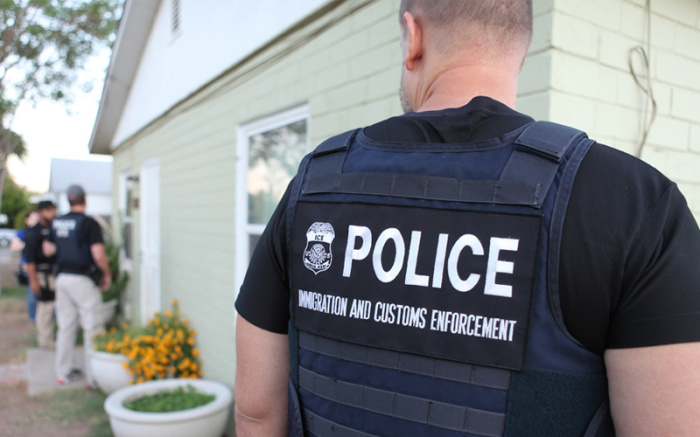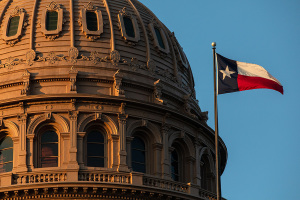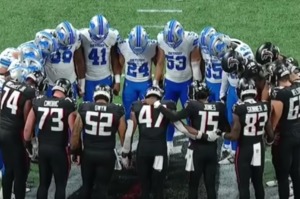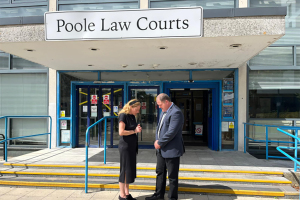Judge won't ban immigration raids on churches, sides with Trump

A federal judge will allow the Trump administration to conduct immigration enforcement raids at churches, ruling against religious groups who argue that it conflicts with their religious freedom.
Judge Dabney Friedrich of the U.S. District Court in Washington rejected a request for a preliminary injunction by more than two dozen Christian and Jewish organizations, stating that only a small number of immigration actions actually occurred at or around religious sites since President Donald Trump took office in January.
The evidence presented did not demonstrate "that places of worship are being singled out as special targets," she stated in a 17-page ruling.
"Since the policy rescission took effect over 10 weeks ago, only one enforcement action has taken place at the hundreds of plaintiffs' member congregations," Friedrich, appointed to the federal bench by President Trump during his initial term, wrote.
"The plaintiffs can point to only three instances since January 20, 2025, where any immigration enforcement action has taken place in or near any place of worship anywhere in the country, even under the current administration's more vigorous immigration priorities and increased."
The religious groups argued that the policy infringes upon their First Amendment rights and discourages attendance at religious services.
Since Trump returned to office in January, attendance at many congregations has reportedly dropped significantly, with some experiencing double-digit declines.
Lawyers for the plaintiffs claimed that fear of immigration enforcement actions at churches is keeping congregants away.
Judge Friedrich found insufficient evidence linking the attendance drops directly to enforcement actions at houses of worship, stating that congregants appeared more concerned about encountering immigration officials in their neighborhoods generally rather than at religious sites specifically.
According to the judge, reversing the church-specific policy alone would not necessarily prompt immigrants to return to worship services.
The contested policy emerged on Jan. 20, Trump's first day back in office, overturning a Department of Homeland Security policy enacted in 2011 during the Obama administration that prevented ICE and CBP from enforcing immigration law in "sensitive" areas, including schools and churches.
Previously, DHS policy significantly restricted immigration enforcement operations in "protected areas," including houses of worship. Under the revised policy, field agents can now carry out enforcement activities at churches using "common sense" and "discretion" without needing approval from supervisors.
"We remain gravely concerned about the impacts of this policy and are committed to protecting foundational rights enshrined in the First Amendment and the Religious Freedom Restoration Act," said Lead counsel for the plaintiffs, Kelsi Corkran, in a statement shared with The Associated Press.
The legal challenge to the policy remains ongoing. The lawsuit cited specific instances of enforcement, including the arrest of an immigrant at a church in Georgia and a search conducted by Immigration and Customs Enforcement at a church-operated daycare center in the same state.
Plaintiffs also provided examples where immigration officials reportedly conducted surveillance near religious institutions, photographing individuals waiting in line for food distribution.
"An immigration enforcement action during worship services, ministry work, or other congregational activities would be devastating to their religious practice," read the suit. "It would shatter the consecrated space of sanctuary, thwart communal worship, and undermine the social service outreach that is central to religious expression and spiritual practice for Plaintiffs' congregations and members."
Christian entities among the plaintiffs included the Mennonite Church, USA, the African Methodist Episcopal Zion Church, the Episcopal Church, the Disciples of Christ, Church of the Brethren, the General Assembly of the Presbyterian Church (USA), and regional bodies of the United Church of Christ and the United Methodist Church.
Other plaintiffs include the Latino Christian National Network, the Central Conference of American Rabbis, the North Carolina Council of Churches, the Union for Reform Judaism, the Unitarian Universalist Association and the United Synagogue of Conservative Judaism.
On Thursday, another federal judge permitted the administration to proceed with plans requiring undocumented individuals to register with authorities. Simultaneously, however, the Supreme Court directed the administration to facilitate the return of a man mistakenly deported to El Salvador.
Meanwhile, Democrats in Congress and several advocacy groups continue to back a bill to prevent immigration enforcement measures in houses of worship and schools.
Rep. Jesús García of Illinois, Rep. Adriano Espaillat of New York and Sen. Richard Blumenthal of Connecticut re-introduced the Protecting Sensitive Locations Act earlier this year.
Previously introduced in 2023, the proposed legislation bars immigration enforcement within 1,000 feet of a "sensitive location" save for "exigent circumstances," such as "the targeted arrest of a terrorist suspect, an individual who poses a clear threat to national security, or an individual who poses an extraordinary danger to public safety."



























